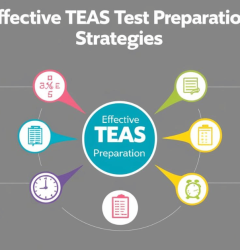- Email: hello@Tutoriffic.com
- Phone: (714) 941 0782

For international students, the journey to successfully taking the TEAS exam is often fraught with challenges that go beyond academic preparation. Understanding how international students navigate the TEAS exam is crucial, as these learners must overcome not only the exam’s rigorous content but also language barriers, cultural differences, and test anxiety. This article delves into their obstacles, from struggling with advanced vocabulary to adjusting to unfamiliar test formats, and offers practical solutions and support systems to help them succeed.
The Unique Challenges of International Students
Language Proficiency
English as a Second Language (ESL) learners often struggle with nuanced questions, academic vocabulary, and word problems in mathematics. These elements are especially tricky in the Reading and English Language Usage sections.
Cultural Differences in Test-Taking
Standardized tests in the U.S. follow specific formats and expectations. International students may be unfamiliar with:
- Multiple-choice test structures
- Strict time constraints
- American idioms or cultural references in reading passages
Stress and Isolation
Moving to a new country is already stressful. Combine that with academic pressure and limited support networks, and it’s easy to see why TEAS exam anxiety can be more severe in this group.
Visa and Immigration Pressure
Failing the TEAS exam can delay program entry, jeopardize visa status or extend costly education timelines—factors that add enormous pressure.
Common Language Barriers on the TEAS Exam
Vocabulary and Reading Comprehension
TEAS reading passages often include:
- Technical scientific terms
- Advanced vocabulary
- Inference-based questions
Grammar and Syntax
Even students with decent spoken English may struggle with:
- Subject-verb agreement
- Sentence structure
- Punctuation rules
- Misleading answer choices
Listening and Processing Speed
Though the TEAS is a written exam, the ability to read quickly and process under time pressure can be especially hard for ESL learners who are translating mentally as they read.
Strategies International Students Use to Overcome Language Barriers
| Strategy | Description |
|---|---|
| Intensive ESL Courses | Focus on grammar, reading speed, and vocabulary building |
| Customized TEAS Prep Materials | Study guides tailored for non-native speakers |
| Practice Exams with Time Limits | Helps with pacing and comfort with exam layout |
| Vocabulary Flashcards and Apps | Tools like Anki or Quizlet for academic vocabulary |
| Peer Study Groups | Collaborative learning with other international students |
| Private Tutoring | One-on-one guidance with a focus on weak areas |
| Online Video Explanations | YouTube channels and platforms explaining TEAS concepts in simple language |
Test Help Solutions: Traditional and Modern Support Systems
Academic Mentors and Tutors
Many international students hire tutors with TEAS-specific knowledge. These professionals help in:
- Explaining complex concepts
- Providing mock tests
- Offering emotional support and guidance
Online Prep Platforms
Platforms like ATI Testing, Mometrix, and NurseHub offer:
- Diagnostic quizzes
- Customized study paths
- Live sessions with instructors
ESL-Friendly Practice Tools
Apps and services that translate questions or explain them in simpler English are growing in popularity. These include:
- Duolingo English Test prep tools
- Bilingual flashcards
- YouTube channels for ESL students
The Rise of Digital Test Help Services
In the digital age, students are turning to more flexible and personalized solutions. With the pressure to perform and limited time, many are exploring unconventional options to get help with the TEAS exam.
Some international students dealing with extreme stress, language obstacles, or urgent deadlines consider academic platforms where they can pay someone to take my TEAS test. While this option may not be ideal for everyone, it reflects a growing demand for tailored support in high-pressure situations.
Ethical Considerations and Student Realities
It’s important to acknowledge the ethical concerns surrounding professional test-taking help. However, this trend also reveals a broader issue—educational institutions must offer more robust support systems for international students, including:
- More inclusive testing accommodations
- TEAS prep resources adapted for ESL learners
- Counseling and language coaching services
Mental Health and Exam Anxiety Among International Students
The intersection of language barriers and exam pressure often leads to increased anxiety. Common symptoms include:
- Sleep issues
- Panic attacks
- Procrastination
- Feeling isolated
Recommended Coping Strategies:
- Campus counseling services
- Meditation and mindfulness apps
- Group therapy for international students
- Time-blocked study plans to avoid burnout
What to Do If You’re Still Struggling
Sometimes, even with the best preparation, the pressure becomes unmanageable. In these cases, some students consider high-stakes alternatives like take my TEAS exam for me services. Though controversial, these options highlight the urgent need for institutions to better support students under exceptional pressure.
Future Recommendations for Schools and Institutions
To make TEAS exam success more attainable for international students, institutions should:
- Offer ESL-specific TEAS workshops
- Provide extra time accommodations on exams
- Design culturally inclusive study materials
- Build support networks through international student groups
Key Takeaways
- Language barriers, cultural differences, and time pressure make the TEAS exam especially challenging for international students.
- ESL-specific prep tools, tutors, and practice exams help overcome these challenges.
- Mental health support is critical to managing stress and preventing burnout.
- Some students under extreme pressure consider services where they can pay someone to take my TEAS test or similar alternatives.
- Institutions must evolve to provide more inclusive, language-friendly, and supportive academic environments for international learners.
Conclusion: International Students Navigate the TEAS Exam
For international students, the TEAS exam is more than just an academic test—it’s a complex challenge influenced by language, culture, and pressure. But with the right support systems and tools, success is absolutely possible. From intensive ESL prep and peer support to digital coaching and personalized study plans, there are now more ways than ever to rise above the barriers.
For some, when traditional resources are not enough, they look into options like take my TEAS exam platforms as a last resort to meet deadlines and academic requirements. Whatever the path, the key lies in finding the support that aligns with your needs and staying committed to your long-term goal of a successful healthcare career.


